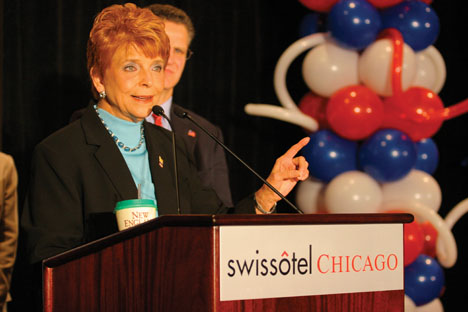Devastated GOP realizes need to change approach

Brad Vest The Daily Illini Judy Baar Topinka, the 2006 Republican nominee for Governor, concedes her race for Illinois Governor in front of a crowd of supporters at the Swissotel in downtown Chicago Tuesday night, November 7, 2006. Topinka’s votes fell short and incumbent Governor Rod R. Blagojevich will serve another term.
Nov 13, 2006
Last updated on May 12, 2016 at 06:18 a.m.
SPRINGFIELD, Ill.- – Illinois Republicans emerged from Tuesday’s election with no clear leaders, no clear message and no clear lessons.
The only certainty, insiders say, is that major changes are needed before the party can compete on a statewide level.
“The whole house has burned down. It’s not just that a gutter has fallen off or a brick is loose. What you’re facing here is a reconstruction project from the ground up,” said GOP political consultant Glenn Hodas.
Does it remake itself into the “ethics party” or focus on education, health care and other voter concerns? What about the right wing’s worries about abortion and gay rights?
Get The Daily Illini in your inbox!
Complicating any rebuilding efforts is the lack of a clear party leader.
Come next year, no Republican will be serving in statewide office, and the GOP is in the minority in both legislative chambers.
Party elders aren’t likely to carry much weight either. Former Gov. Jim Edgar was instrumental in launching Judy Baar Topinka’s failed campaign for governor, while Bob Kjellander, Illinois member of the Republican National Committee, is under an ethics cloud that has prompted calls for his resignation.
But the depth of the Republican defeat goes beyond failing to oust a vulnerable Democratic governor or being swept in every statewide race.
The percentage of voters identifying themselves as Democrats jumped to 46 percent, up from 39 percent just two years ago. Among Hispanics, the state’s fastest-growing ethnic group, voters overwhelmingly consider themselves Democrats.
Democrats also scored wins in areas that used to be solidly Republican. Blagojevich carried Will County, for instance, and Democrats won sheriff’s races in Lake and Kane counties. Democrats picked up several open Senate seats in the Chicago suburbs – enough to gain a “super-majority” in the state Senate.
“I just don’t know where the party’s going to go,” Edgar said Friday during a panel discussion of the election. “This has been one of the most depressing weeks of my political life.”
Edgar’s prescription is to recast the GOP as the party of ethics, emphasize its reputation for spending tax money wisely and adopt positions more in tune with the majority of Illinoisans on stem cell research, immigration and other issues.
State Sen. Bill Brady, who ran against Topinka in the gubernatorial primary, talked about regaining the “trust and respect” of independents and even Democrats – not just die-hard Republicans. The party, he said, must offer candidates who will be seen as honest and careful with taxpayers’ money.
Sen. Steve Rauschenberger, who also briefly sought the nomination, argued that Republicans have not done enough to offer solutions to voters’ problems, particularly on health care and education. The party can find new life by setting aside ideological debates and coming up with new ideas instead, he said.
“What the voters have done is sent a message to Republicans nationwide, and in Illinois in particular, that we’re not relevant right now,” Rauschenberger said.
Associated Press reporter Tara Burghart contributed to this report.





